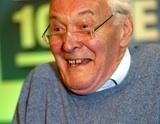
Former Labour MP Tony Benn defied the BBC’s self-imposed ban on broadcasting an appeal for the people of Gaza – by hijacking an interview on the Today to make the appeal himself.
Benn was asked on the Today programme this morning to argue the case for the BBC broadcasting the Disasters Emergency Committee appeal.
The BBC has come under mounting pressure to screen the emergency appeal, after ITV, Channel 4 and Five all announced today that they would be showing it.
Thousands of protesters joined a demonstration in London, while a string of politicians, including senior Government ministers, urged the BBC to reconsider its decision.
BBC chief operating officer Caroline Thomson said the BBC refuses to broadcast the appeal because to do so could compromise its editorial impartiality and for fear money raised could be used for political purposes by Hamas.
When asked to comment on this by Ed Stourton on Today, Benn said: “£50 would provide a food parcel for a family for a month.
“There are a million and a half people in Gaza without water, sanitation, shelter or electricity; 1330 have been killed, there are 5,450 casualties; 460 children.
“What I’m going to do now is to do the appeal myself and say if you want to make a cheque payable to the Disasters Emergency Committee Gaza Crisis, post it to PO Box 999, London EC3A 3AA or go to any post office quoting pre-pay number 1210.”
When Stourton tried to steer Benn back towards answering his original question, the 83-year-old campaigner replied: “I’m going to go on repeating it [the appeal] until you turn me out of the studio.”
Protest outside BBC
Police estimated that 5,000 people took part in a march to Trafalgar Square, during which some demonstrators threw shoes at the BBC’s Broadcasting House. Six protesters were arrested for obstructing police, but there was no violence.
The DEC – which brings together several major aid charities including the British Red Cross, Save the Children and Oxfam – wants the appeal to be broadcast on TV and radio from Monday to help raise millions of pounds for people in need of food, medicines and shelter following Israel’s three-week assault on the Palestinian territory.
In an entry on the BBC editors’ blog, BBC director general Mark Thompson acknowledged that the concerns over the practicality of delivering aid which were initially cited as a reason for refusing to screen the appeal may soon become irrelevant.
But he added: “There is a second more fundamental reason why we decided that we should not broadcast the appeal at present.
“This is because Gaza remains a major ongoing news story, in which humanitarian issues – the suffering and distress of civilians and combatants on both sides of the conflict, the debate about who is responsible for causing it and what should be done about it – are both at the heart of the story and contentious.”
The BBC had covered the human side of the Gaza conflict in its news services, where it could be done “in an objective and balanced way”, he said.
Any appeal would inevitably use similar footage to that broadcast by BBC news programmes, but would use it in a bid to solicit public donations.
“The danger for the BBC is that this could be interpreted as taking a political stance on an ongoing story,” said Mr Thompson.
“When we have turned down DEC appeals in the past on impartiality grounds it has been because of this risk of giving the public the impression that the BBC was taking sides in an ongoing conflict.”
The BBC had a strong track-record in supporting DEC appeals, as well as promoting humanitarian work through events such as Children in Need, Thompson said.
“This is an important part of what it is to be a public service broadcaster,” he wrote.
“It is sometimes not a comfortable place to be, but we have a duty to ensure that nothing risks undermining our impartiality. It is to protect that impartiality that we have made this difficult decision.”
Politicians condemn decision
But his argument was dismissed as “completely feeble” by health minister Ben Bradshaw, while communities secretary Hazel Blears called on the BBC to review its decision and urged the public to continue donating to the DEC appeal.
Britain’s first Muslim minister Shahid Malik warned that the corporation’s decision would be seen around the world as “one which inflicts still further misery on the beleaguered and suffering people of Gaza”.
Calls for the broadcast to be shown also came from Conservatives, Liberal Democrats and Scottish National Party leader Alex Salmond.
But BBC Trust chairman Sir Michael Lyons voiced concern that comments made by politicians were coming close to “undue interference” in the BBC’s editorial independence.
He said that the judgment on whether the broadcast should be shown was not for the Trust, which oversees the corporation on behalf of the public, but for the BBC’s senior editorial executives.
A Channel 4 spokesman told Press Gazette that it was not consulted on the original decision taken by the other broadcasters not to air the appeal.
“Channel 4 will broadcast the DEC appeal for humanitarian aid for civillians caught up in the Gaza conflict,” he said today.
“We believe Channel 4’s news coverage of the conflict in Gaza has at all times been appropriately impartial and we do not believe our impartiality will be compromised in the eyes of our audience by broadcasting this appeal.”
Audio: Tony Benn on Today
Disasters Emergency Committee
BBC editors’ blog
Email pged@pressgazette.co.uk to point out mistakes, provide story tips or send in a letter for publication on our "Letters Page" blog

